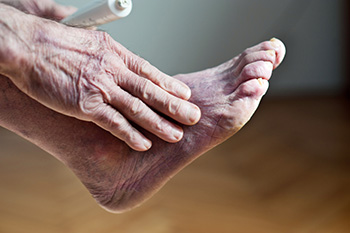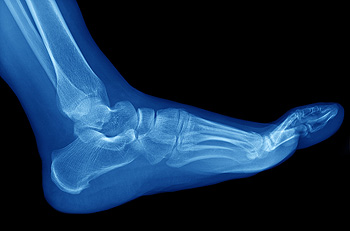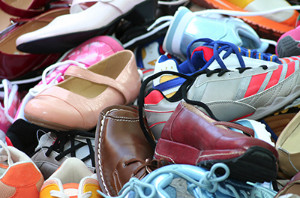Connect With Us
Blog
Items filtered by date: April 2022
What Is Raynaud’s Phenomenon?

If you experience unusually cold feet, you may have a condition known as Raynaud’s phenomenon. This condition may simply be caused by over-sensitive blood vessels that constrict abnormally in colder temperatures. It occurs because the small blood vessels spasm and keep the blood from circulating properly. Symptoms may be triggered by a drop in the temperature, as well as anxiety or stress. In many cases no actual cause for Raynaud’s can be found, aside from a disruption in how the nervous system controls the blood vessels. In other cases, it can be linked to underlying causes. Among them are autoimmune conditions, such as rheumatoid arthritis or lupus; infections, such as hepatitis; cancer; and certain migraine, blood pressure and heart medications. Injury and overuse has been linked to Raynaud’s phenomenon, as has smoking. Please see a podiatrist for an examination to determine the cause of excessive cold feet.
Poor circulation is a serious condition and needs immediate medical attention. If you have any concerns with poor circulation in your feet contact Dr. John R. Northrup of Superior Foot, Ankle & Wound Care. Our doctors will treat your foot and ankle needs.
Poor Circulation in the Feet
Poor blood circulation in the feet and legs is can be caused by peripheral artery disease (PAD), which is the result of a buildup of plaque in the arteries.
Plaque buildup or atherosclerosis results from excess calcium and cholesterol in the bloodstream. This can restrict the amount of blood which can flow through the arteries. Poor blood circulation in the feet and legs are sometimes caused by inflammation in the blood vessels, known as vasculitis.
Causes
Lack of oxygen and oxygen from poor blood circulation restricts muscle growth and development. It can also cause:
- Muscle pain, stiffness, or weakness
- Numbness or cramping in the legs
- Skin discoloration
- Slower nail & hair growth
- Erectile dysfunction
Those who have diabetes or smoke are at greatest risk for poor circulation, as are those who are over 50. If you have poor circulation in the feet and legs it may be caused by PAD and is important to make changes to your lifestyle in order to reduce risk of getting a heart attack or stroke. Exercise and maintaining a healthy lifestyle will dramatically improve conditions.
As always, see a podiatrist as he or she will assist in finding a regimen that suits you. A podiatrist can also prescribe you any needed medication.
If you have any questions please feel free to contact one of our offices located in St. Augustine, and Palm Coast, FL . We offer the newest diagnostic and treatment technologies for all your foot and ankle needs.
All About Your Feet
It’s easy to depend on our feet to stand, walk, run, exercise, play sports, and dance. But even though our feet are such an important part of our lives, they are, quite frankly, often either taken for granted or ignored. The foot is a complex collection of 26 bones, 33 joints, more than 100 ligaments, and a number of muscles. These work to get us where we want to go and do what we want them to do, most of the time without any real conscious thought. As you age, or if you are extremely active, however, caring for your feet becomes more important. Parts wear out, bones get thinner, padding starts to disappear, and injury can follow. Some simple basics can keep your feet healthy: keeping your feet clean, dry and moisturized daily is a good idea. Checking for calluses and corns and having them removed is recommended. Keeping toenails in good trim and straight across, helps prevent ingrown toenails. Proper footwear that offers room for your toes, support for your arches, padding for your heels, and avoiding high heels are other ways to protect your feet. It is suggested that you make regular appointments for a checkup with a podiatrist, especially if you have any foot pain or deformities, to promote good foot health.
Everyday foot care is very important to prevent infection and other foot ailments. If you need your feet checked, contact Dr. John R. Northrup from Superior Foot, Ankle & Wound Care. Our doctors can provide the care you need to keep you pain-free and on your feet.
Everyday Foot Care
Often, people take care of their bodies, face and hair more so than they do for their feet. But the feet are a very important aspect of our bodies, and one that we should pay more attention to. Without our feet, we would not be able to perform most daily tasks.
It is best to check your feet regularly to make sure there are no new bruises or cuts that you may not have noticed before. For dry feet, moisturizer can easily be a remedy and can be applied as often as necessary to the affected areas. Wearing shoes that fit well can also help you maintain good foot health, as well as making it easier to walk and do daily activities without the stress or pain of ill-fitting shoes, high heels, or even flip flops. Wearing clean socks with closed shoes is important to ensure that sweat and bacteria do not accumulate within the shoe. Clean socks help to prevent Athlete’s foot, fungi problems, bad odors, and can absorb sweat.
If you have any questions please feel free to contact one of our offices located in St. Augustine, and Palm Coast, FL . We offer the newest diagnostic and treatment technologies for all your foot and ankle needs.
Finding the Proper Shoes for Wide Feet
Many people have trouble finding shoes wide enough to fit their feet. Stuffing your feet into shoes that are too narrow can cause numerous problems that include bunions, calluses, hammertoe, and crossover toe, when one toe sits on top of another because they are squeezed too tightly inside the shoe. Thankfully, there are a few things that can help people with wider feet. When shopping, ask if wide sizes are available. Wear the type of sock or foot covering you would be using for that particular shoe. Your toes should not feel cramped, and there should be some space between the tip of the shoe and your toes. If one foot is longer than the other, purchase the size to fit the larger foot. If you are experiencing pain in your feet, it is a good idea to see a podiatrist who can help you determine the cause and offer guidance about footwear.
Getting the right shoe size is an important part of proper foot health. Seek the assistance of Dr. John R. Northrup from Superior Foot, Ankle & Wound Care. Our doctors will provide the care you need to keep you pain-free and on your feet.
Getting the Right Shoe Size
There are many people who wear shoes that are the incorrect size, negatively affecting their feet and posture. Selecting the right shoes is not a difficult process, so long as you keep several things in mind when it comes to choosing the right pair.
- When visiting the shoe store, use the tools available to measure your foot.
- Be sure there is ‘wiggle room’. There should be about an inch between your toes and the tip of your shoes.
- Do not always assume you are the same size, as manufacturers run differently.
- Purchase shoes later in the day, as your feet swell as the day progresses.
- If a shoe is not comfortable, it is not suitable. Most shoes can’t be ‘broken in’, and comfort should be the ultimate goal when it comes to choosing the right pair of shoes
As our feet hold our body weight and keep us moving, it is important to treat them right. Picking the right pair of shoes can provide your feet comfort and mobility without pain.
If you have any questions, please feel free to contact one of our offices located in St. Augustine, and Palm Coast, FL . We offer the newest diagnostic and treatment technologies for all your foot care needs.
Are Bunions Affecting Your Everyday Life?
What May Trigger Peripheral Neuropathy?
If you are experiencing stabbing or burning nerve pain, numbness, weakness, or tingling in the feet, you may have peripheral neuropathy. Peripheral neuropathy is a dysfunction of the body’s peripheral nervous system, which is outside of the central nervous system (the brain and spinal cord). Peripheral neuropathy can be caused by some sort of damage or illness to a nerve (or nerves)—anywhere along the pathway from the spine to the feet—or from spinal problems. It may also be associated with certain medical conditions such as arthritis, Charcot–Marie–Tooth disease, Lyme disease, or shingles. Alcoholism or side effects from certain medications may even damage the peripheral nerves. Peripheral neuropathy should not be taken lightly, as it may lead to the formation of foot ulcers or circulatory disorders, as well as other complications. If you believe you may have peripheral neuropathy, make an appointment with a podiatrist as soon as possible to have your condition diagnosed and treated properly.
Neuropathy
Neuropathy can be a potentially serious condition, especially if it is left undiagnosed. If you have any concerns that you may be experiencing nerve loss in your feet, consult with Dr. John R. Northrup from Superior Foot, Ankle & Wound Care. Our doctors will assess your condition and provide you with quality foot and ankle treatment for neuropathy.
What Is Neuropathy?
Neuropathy is a condition that leads to damage to the nerves in the body. Peripheral neuropathy, or neuropathy that affects your peripheral nervous system, usually occurs in the feet. Neuropathy can be triggered by a number of different causes. Such causes include diabetes, infections, cancers, disorders, and toxic substances.
Symptoms of Neuropathy Include:
- Numbness
- Sensation loss
- Prickling and tingling sensations
- Throbbing, freezing, burning pains
- Muscle weakness
Those with diabetes are at serious risk due to being unable to feel an ulcer on their feet. Diabetics usually also suffer from poor blood circulation. This can lead to the wound not healing, infections occurring, and the limb may have to be amputated.
Treatment
To treat neuropathy in the foot, podiatrists will first diagnose the cause of the neuropathy. Figuring out the underlying cause of the neuropathy will allow the podiatrist to prescribe the best treatment, whether it be caused by diabetes, toxic substance exposure, infection, etc. If the nerve has not died, then it’s possible that sensation may be able to return to the foot.
Pain medication may be issued for pain. Electrical nerve stimulation can be used to stimulate nerves. If the neuropathy is caused from pressure on the nerves, then surgery may be necessary.
If you have any questions, please feel free to contact one of our offices located in St. Augustine, and Palm Coast, FL . We offer the newest diagnostic and treatment technologies for all your foot care needs.




